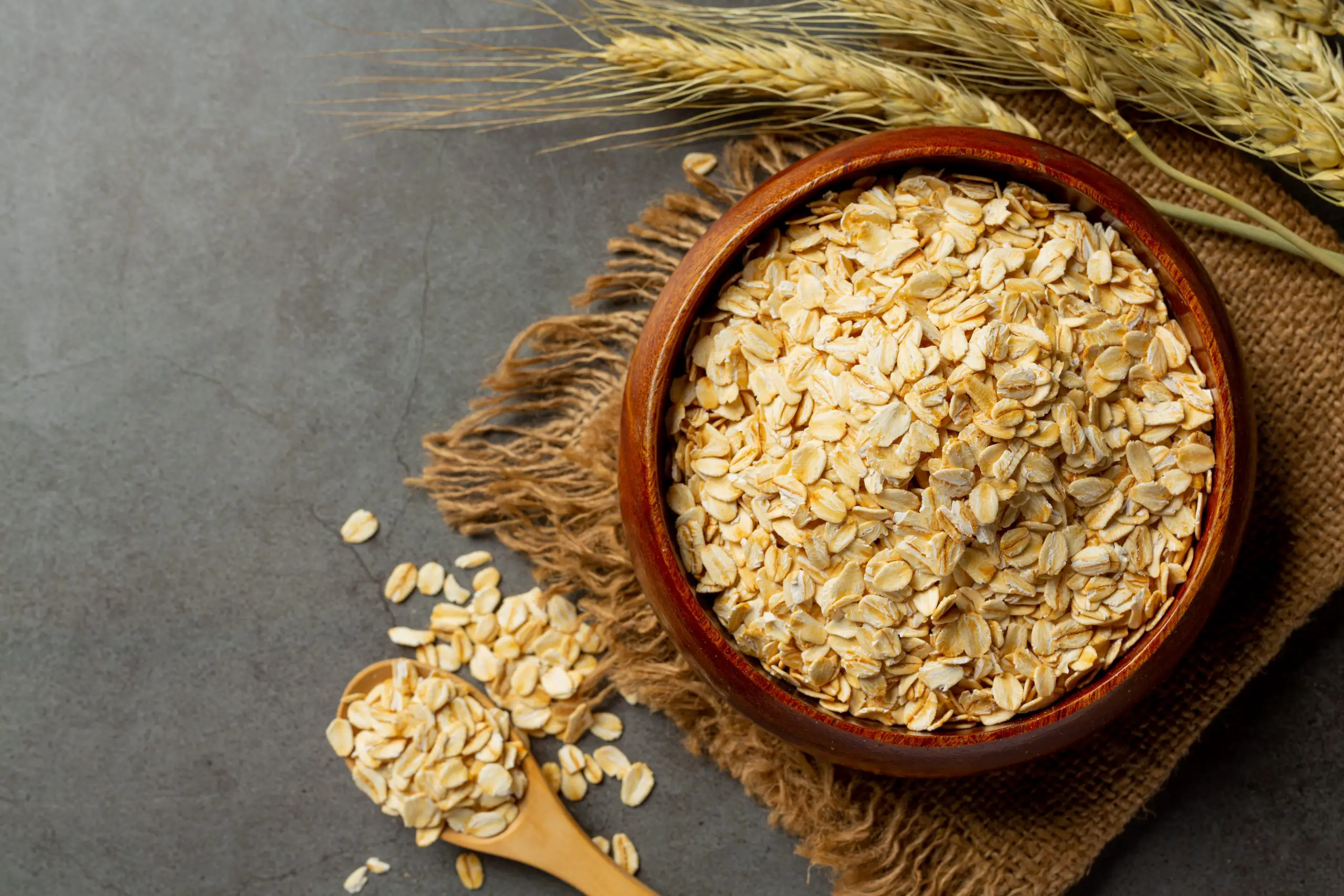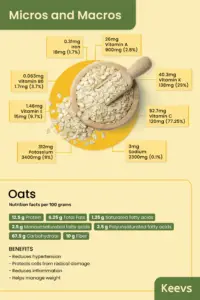Oats Nutrition Facts 100g: Health Benefits of Eating Oats

Oats are not only gluten free but are also highly beneficial.
Try them and you may never turn back!
Waking up and heading to the kitchen to see that your breakfast is already served is one of the best feelings ever.
Once you switch to oats, this is a feeling you will experience almost every other day.
It is easy to make and super healthy!

Oats, how nutritious are they?
Oats, scientifically known as Avena sativa, are whole grain food. They are essentially the seeds of the oat plant.
These grains are highly nutritious and are a great source of various minerals, fiber, and antioxidants.
Oats are commonly eaten in the form of oatmeal or rolled oats. They need to be cooked before consumption and therefore are ideally boiled in water or milk.
Since they are pretty much tasteless, we often add various other ingredients like honey, fruits, chocolate, vegetables, nuts etc., to enhance their flavour.
Also Read: Vitamins in Honey: Health Benefits of Honey You Need to Know
| Oats are primarily cultivated for livestock feed. However, we humans have been consuming it for ages due to its various health benefits! |
Did you know that all oats are not gluten-free?
Commercial oats are often contaminated with other ingredients and can be harmful to people with gluten allergies.
However, if not commercially bought, pure oats are definitely gluten-free.
Therefore it is essential to ensure your oats are coming from the right place. (1)
Are oats a part of your diet?
| Yes! They’re my favourite. | Nope, not a fan |
If you said no, then making it a part of your diet is something you should consider.
It is highly nutritious and can be highly beneficial to your body.
Some of the benefits would be lowering cholesterol levels, improving blood sugar control, and decreasing the risk of childhood asthma.
If the taste is what puts you off, you can always consider adding your favourite fruits, sweeteners, or spicy seasoning to give it a desi touch.
What are the nutritional facts of 100g of oats?
How exactly are oats nutritious?
What are oats nutrition facts 100g?
If these are questions that might have crossed your mind, then we have the answers for you!
The following are oats nutrition facts 100g according to the USDA. (2)
| Nutrients | Content in 100g | RDA (% of total RDA) |
| Carbohydrate | 67.5 g | 130 g (51.9%) |
| Fiber | 10 g | 30 g (33.3%) |
| Iron | 4.5 mg | 18 mg (25%) |
| Protein | 12.5 g | 52 g (24%) |
| Polyunsaturated fatty acids | 2.5 g | 22 g (11.3%) |
| Total lipid (fat) | 6.25 g | 77 g (8.11%) |
| 0.1 mg | 1.2 mg (8.3%) | |
| Monounsaturated fatty acids | 2.5 g | 44 g (5.6%) |
| Saturated fatty acids | 1.25 g | 30 g (4.1%) |
| 0.42 mg | 15 mg (2.8%) |
100g of oats gives our body 350 kcal of energy. That is enough to keep our body going for quite some time!
Apart from energy, oats also give us the benefits of all these nutrients.
They don’t just fuel our body; they ensure it is in good health and well-nourished!
Also Read: Rice Nutrition Facts 100g: Rice Nutrition Facts and Health Benefits
Oats Nutritional Information
Nutrition Facts
Serving Size100g
- % Daily Value *
- Total Fat
6.25g
10%
- Saturated Fat 1.25g 7%
- Trans Fat 5g
- Total Carbohydrate
67.5g
23%
- Dietary Fiber 10g 40%
- Protein 12.5g 25%
- Iron 4.5%
- Vitamin E 0.42%
* The % Daily Value tells you how much a nutrient in a serving of food contributes to a daily diet. 2,000 calories a day is used for general nutrition advice.
Other beneficial compounds found in oats
- Beta-glucan
Beta-glucan is a type of soluble fibre that plays an essential role in our body.
Some of which are boosting your immunity, improving skin conditions like eczema, bed sores, etc. and helping fight bacterial infections.
- Avenanthramides
Avenanthramides, a compound found mainly in oats, is known to exhibit strong antioxidant, anti-inflammatory, and antiproliferative properties.
These properties provide protection against various cellular dysfunctions and human pathologies, including age-related diseases.
Health Benefits of Oats
We know our body requires nutrients to function. We also know that oats are highly nutritional after going through the nutritional facts of 100g of oats.
Putting these two statements together, you might wonder how exactly oats and their nutrients benefit our body; so, let’s put your mind at ease and dive right into the various benefits of oats!
Oats are rich in fiber, one of them being beta-glucan.
Beta-glucan is a soluble dietary fiber that has been known to reduce blood cholesterol levels as well as blood pressure.
Studies show that dietary consumption of fibre, especially beta-glucan, has proven to reduce hypertension and improve heart health.
Apart from reducing complications associated with diabetes, beta-glucans also promote wound healing and alleviate ischemic heart injury.
Inflammation is caused when the tissues in the body are injured, under trauma or stress.
Avenanthramides, an antioxidant found almost exclusively in oats, can help reduce inflammation and itching.
It also improves blood flow in the body.
Oxidative stress and free radicals often damage our cells; the antioxidants present in oats can help protect these cells and help restore them.
- Manages weight (7)
Oats are rich in soluble fibre, a type of dietary fibre that dissolves in water to form a gel-like substance.
The presence of these fibres keep you feeling full for a more extended period.
This can reduce your portion size while also reducing your cravings during the day.
This way, you can watch your weight while also staying healthy!
| Oats are a rich source of fibres, antioxidants and various other nutrients. It can reduce the risk of cardiovascular diseases, protect cells from damage, and manage weight loss. |
How to consume oats?
Oats should be boiled in water or milk before adding any toppings.
You could top them with your favorite fruits and make your bowl as colourful as you want.
If not for cooking them, you could soak your oats overnight before consumption.
If you’re feeling adventurous, you could also go ahead and make your very own oat milk!
The types of oats you’ll find in the market, apart from the flavoured ones, are rolled oats and oat groats.
The only difference is in how much each is processed.
Rolled oats are steamed and flattened to reduce the cooking time, whereas oat groats are the least processed oats.
A few flavoured oats that you could try are masala oats, oats and honey, and fruits and oats.
Also Read: Vitamins in Milk: Health Benefits of Milk You Need to Know
How much to consume oats in a day?
According to the USDA, the ideal amount to consume in a day would be half a cup (50g) or one serving.
Half a cup of oats has 190 calories, out of which you will receive 3.5g of healthy fat, 35g of carbs, and 5g of protein.
Since oatmeal is rich in fibres and is considered a whole grain food item, half a cup should keep you full for quite some time.
What if I consume too much oats?
Although nutritious, overconsumption of oats could lead to side effects like malnutrition and muscle mass shedding.
The excessive consumption of fibre limits the absorption of nutrients and could lead to malnutrition.
It also keeps you full for a more extended period and as a result, your body loses the ability to signal you to eat throughout the day.
Also Read: Paneer Nutritional Value Per 100g
How to store oats?
An unopened bag of oats should be kept in a cool, dry place. If opened, ensure to store it in an airtight container or bag.
It is best to use your opened bag of oats within one year.
Wrapping up
Oats, a nutritious whole grain food, brings to the table quite a few benefits.
The fibre in oats play various roles, from maintaining cardiovascular to protecting cells from damage.
However, like every other food item, you should always watch your intake and ensure you consume it in the right proportion.
References
- Comino, Isabel et al. “Role of oats in celiac disease.” World journal of gastroenterology vol. 21,41 (2015): 11825-31.
- USDA. “[HISTORICAL RECORD]: OATS.” Food Data Central, (2019)
- El Khoury, D et al. “Beta glucan: health benefits in obesity and metabolic syndrome.” Journal of nutrition and metabolism vol. 2012 (2012): 851362.
- Chen, Jiezhong, and Kenneth Raymond. “Beta-glucans in the treatment of diabetes and associated cardiovascular risks.” Vascular health and risk management vol. 4,6 (2008): 1265-72.
- Sur, Runa et al. “Avenanthramides, polyphenols from oats, exhibit anti-inflammatory and anti-itch activity.” Archives of dermatological research vol. 300,10 (2008): 569-74.
- Lobo, V et al. “Free radicals, antioxidants and functional foods: Impact on human health.” Pharmacognosy reviews vol. 4,8 (2010): 118-26.
- Li, Xue et al. “Short- and Long-Term Effects of Wholegrain Oat Intake on Weight Management and Glucolipid Metabolism in Overweight Type-2 Diabetics: A Randomized Control Trial.” Nutrients vol. 8,9 (2016): 549.
![Blue Foods List [with pictures]](https://keevs.com/wp-content/uploads/2023/03/Blue-Foods-List-with-pictures-300x158.png)






